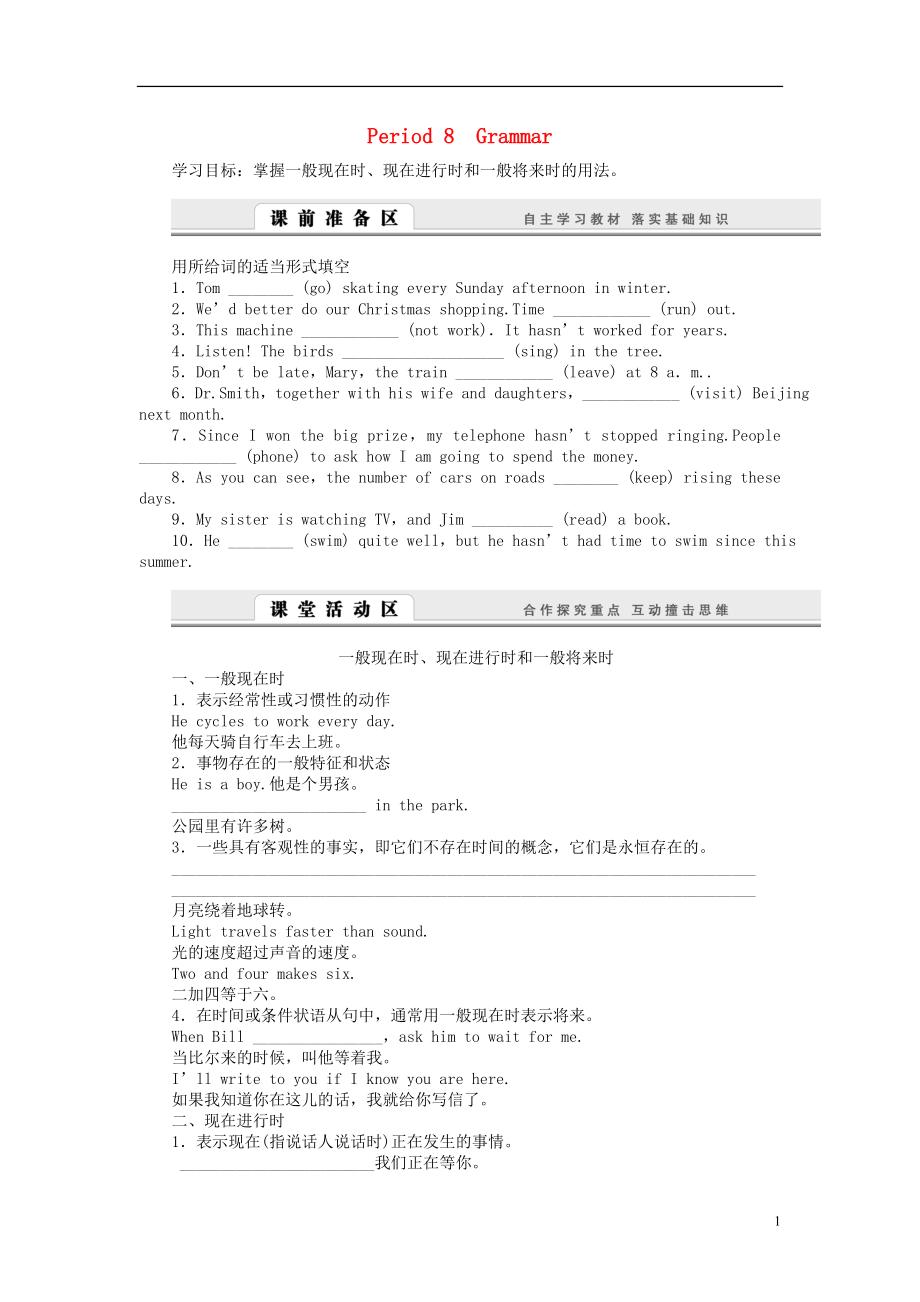《2014-2015學(xué)年高中英語(yǔ) Unit1 Period8 Grammar學(xué)案 北師大版必修1》由會(huì)員分享�,可在線閱讀,更多相關(guān)《2014-2015學(xué)年高中英語(yǔ) Unit1 Period8 Grammar學(xué)案 北師大版必修1(4頁(yè)珍藏版)》請(qǐng)?jiān)谘b配圖網(wǎng)上搜索��。
1��、
Period 8 Grammar
學(xué)習(xí)目標(biāo):掌握一般現(xiàn)在時(shí)���、現(xiàn)在進(jìn)行時(shí)和一般將來時(shí)的用法�。
用所給詞的適當(dāng)形式填空
1.Tom ________ (go) skating every Sunday afternoon in winter.
2.We’d better do our Christmas shopping.Time ____________ (run) out.
3.This machine ____________ (not work).It hasn’t worked for years.
4.Listen! The birds ______________
2�、______ (sing) in the tree.
5.Don’t be late,Mary�,the train ____________ (leave) at 8 a.m..
6.Dr.Smith,together with his wife and daughters�����,____________ (visit) Beijing next month.
7.Since I won the big prize�,my telephone hasn’t stopped ringing.People ____________ (phone) to ask how I am going to s
3、pend the money.
8.As you can see�,the number of cars on roads ________ (keep) rising these days.
9.My sister is watching TV,and Jim __________ (read) a book.
10.He ________ (swim) quite well���,but he hasn’t had time to swim since this summer.
一般現(xiàn)在時(shí)�、現(xiàn)在進(jìn)行時(shí)和一般將來時(shí)
一、一般現(xiàn)在時(shí)
1.表示經(jīng)常性或習(xí)慣性的動(dòng)作
He cycles
4�����、to work every day.
他每天騎自行車去上班��。
2.事物存在的一般特征和狀態(tài)
He is a boy.他是個(gè)男孩���。
________________________ in the park.
公園里有許多樹。
3.一些具有客觀性的事實(shí)��,即它們不存在時(shí)間的概念��,它們是永恒存在的�����。
________________________________________________________________________
________________________________________________________________________
5����、
月亮繞著地球轉(zhuǎn)。
Light travels faster than sound.
光的速度超過聲音的速度�。
Two and four makes six.
二加四等于六。
4.在時(shí)間或條件狀語(yǔ)從句中�����,通常用一般現(xiàn)在時(shí)表示將來。
When Bill ________________�,ask him to wait for me.
當(dāng)比爾來的時(shí)候,叫他等著我���。
I’ll write to you if I know you are here.
如果我知道你在這兒的話��,我就給你寫信了��。
二�����、現(xiàn)在進(jìn)行時(shí)
1.表示現(xiàn)在(指說話人說話時(shí))正在發(fā)生的事情����。
_________
6���、_______________我們正在等你����。
2.表示長(zhǎng)期的或重復(fù)性的動(dòng)作,說話時(shí)動(dòng)作未必正在進(jìn)行��。
Mr.Green is writing another novel.
格林先生在寫另外一部小說����。(說話時(shí)并未在寫,只處于寫作的狀態(tài)���。)
3.表示漸變的過程���,常見的動(dòng)詞有:get,grow�����,become���,turn,run����,go,begin等�����。
The leaves are turning red.葉子變紅了。
________________ warmer and warmer.
天變得越來越暖和了��。
4.常與always連用����,表示反復(fù)發(fā)生的動(dòng)作或持續(xù)存在的狀態(tài),往往帶有說話人的
7����、主觀色彩。
You ________ always __________ your mind.
你老是改變主意�����。(不滿)
He is always thinking of others first.
他總是先想到別人����。(贊揚(yáng))
三、一般將來時(shí)
一般將來時(shí)表示在將來的某個(gè)時(shí)候?qū)⒁l(fā)生的動(dòng)作或存在的狀態(tài)����。
The concert __________________ in a minute.
音樂會(huì)馬上就開始了。
一般將來時(shí)的表達(dá)方法:
1.“be going to+動(dòng)詞原形”結(jié)構(gòu)的用法
(1)這種結(jié)構(gòu)表示主語(yǔ)現(xiàn)在的意圖���,即打算在最近或?qū)硪瞿呈?��,主語(yǔ)通常指人����。
What
8�、 ________ you ____________________ next Sunday?
下星期天你打算干什么?
(2)表示說話人根據(jù)已有的跡象認(rèn)為很可能即將發(fā)生某事�。這時(shí)主語(yǔ)既可指人也可指物,此結(jié)構(gòu)往往表示客觀事態(tài)的發(fā)展��,而不是表示主觀的意圖�。
—Look at these black clouds.
——看這些烏云。
—________________________________________________________________________
——天快要下雨了���。
2.“will/shall+動(dòng)詞原形”結(jié)構(gòu)的用法
這種結(jié)構(gòu)是表示將來的動(dòng)作或狀態(tài)��。常伴
9、有表示將來的時(shí)間狀語(yǔ)��。shall用于第一人稱���,will用于第二���、三人稱��,但在現(xiàn)代英語(yǔ)中will可以通用于各種人稱�。在問句中shall常用于第一人稱表示建議或征求對(duì)方意見��。
________________________________________________________________________
今晚你有空嗎��?
________________________________________________________________________
我們?nèi)ス珗@好嗎����?
3.某些表示位置移動(dòng)的詞如:go,come��,leave���,start等���,常用其進(jìn)行時(shí)表示將來。
10��、
He is coming to see you tomorrow.
他明天來看你�。
The plane ____________ for London.
飛機(jī)就要飛往倫敦了。
4.表示按照計(jì)劃或時(shí)刻表等進(jìn)行的動(dòng)作��,常用一般現(xiàn)在時(shí)表示將來。
The plane ________________ at 1∶18.
飛機(jī)1點(diǎn)18分起飛����。
The sports meeting takes place on October 18.
運(yùn)動(dòng)會(huì)將于十月十八日舉行。
1.Planning so far ahead ________ no sense—so many things wil
11��、l have changed by next year.(2011·新課標(biāo)全國(guó)����,23)
A.made B.is making
C.makes D.has made
2.—What do you think of store shopping in the future?
—Personally,I think it will exist along with home shopping but ________.(2011·安徽����,26)
A.will never replace
B.would never replace
C.will never be rep
12、laced
D.would never be replaced
3.Barbara is easy to recognize as she’s the only one of the women who ________ evening dress.(2010·全國(guó)Ⅱ��,9)
A.wear B.wears
C.has worn D.have worn
4.I ________ all the cooking for my family��,but recently I’ve been too busy to do it.(2010·遼寧����,30)
A.will do
13���、 B.do
C.a(chǎn)m doing D.had done
5.—I’m not finished with my dinner yet.
—But our friends __________ for us.(2010·北京�����,24)
A.will wait B.wait
C.have waited D.a(chǎn)re waiting
6.—Ann is in hospital.
—Oh���,really�����?I ________ know.I ________ go and visit her.(2009·江蘇���,22)
A.didn’t;am going to
B.
14���、don’t����;would
C.don’t��;will
D.didn’t���;will
Period 8 Grammar
課前準(zhǔn)備區(qū)
1.goes 2.is running 3.doesn’t work 4.are singing
5.leaves 6.is going to/will visit 7.are phoning
8.keeps 9.is reading 10.swims
課堂活動(dòng)區(qū)
一�����、2.There are many trees 3.The moon moves round the earth. es
二���、1.We are wait
15���、ing for you.
3.It’s getting 4.are;changing
三�����、will start 1.(1)are�;going to do (2)It’s going to rain. 2.Will you be free this evening?�����;Shall we go to the park����? 3.is leaving 4.takes off
感悟高考
1.C [句意為:這么早就作計(jì)劃是沒有意義的——到了明年,有許多情況會(huì)發(fā)生變化���。此處說明現(xiàn)在的事實(shí)�����,故用一般現(xiàn)在時(shí)�。部分考生由于受so far的影響會(huì)誤選D��,其實(shí)這兒的so far不是表示“到目前為止”��,此處so是用
16��、來修飾短語(yǔ)far ahead的��,far ahead很早����,so far ahead如此早。B項(xiàng)為現(xiàn)在進(jìn)行時(shí)����,不合題意,可排除�����;根據(jù)時(shí)態(tài)一致原則���,A項(xiàng)也可排除�����。]
2.C [句意為:——你如何看待未來的商店購(gòu)物�?——就我個(gè)人而言,我認(rèn)為它將會(huì)和家居購(gòu)物并存但永遠(yuǎn)不會(huì)被取代���。答語(yǔ)中的it指代問句中的store shopping�����。由句意可知store shopping和replace之間是被動(dòng)關(guān)系���,A項(xiàng)和B項(xiàng)均是主動(dòng)語(yǔ)態(tài),不符合句意�;D項(xiàng)為過去將來時(shí)的被動(dòng)語(yǔ)態(tài),不符合時(shí)態(tài)一致的原則��;只有C項(xiàng)是一般將來時(shí)的被動(dòng)語(yǔ)態(tài)���,符合句意�����。]
3.B [考查主謂一致和時(shí)態(tài)����。the only one of...為先
17、行詞時(shí)��,定語(yǔ)從句修飾的是one����,即one是主語(yǔ)���,而非后面的復(fù)數(shù)women��,根據(jù)主謂一致的原則��,謂語(yǔ)動(dòng)詞應(yīng)該用單數(shù)�,排除A��、D�����。另外�����,從“is”可以看出句子是要表示一種習(xí)慣,因此要用一般現(xiàn)在時(shí)��,排除C�����。]
4.B [句意為:我為一家人做飯��,但是最近我太忙不能做了��?���?疾閯?dòng)詞時(shí)態(tài)。前半句表示現(xiàn)階段的一種狀況���,所以用一般現(xiàn)在時(shí)態(tài)��。]
5.D [第一個(gè)說話人說“我還沒吃完飯呢”��,而第二個(gè)人則說“但是我們的朋友們都在等我們了”�。根據(jù)第一個(gè)人還沒進(jìn)行完吃飯的動(dòng)作��,而第二個(gè)人又開始催促,我們得知朋友們此時(shí)正在等他們�����。所以用進(jìn)行時(shí)are waiting更符合句意�。]
6.D [在聽完第一個(gè)說話者的話之后“我不知道Ann在住院”這個(gè)情況就已經(jīng)成為過去,所以要用一般過去時(shí)����,因此可以排除B��、C兩項(xiàng)�;我去看她這個(gè)動(dòng)作發(fā)生在將來,是臨時(shí)決定要去做某事�,沒有計(jì)劃和安排性,所以用will���,不用be going to結(jié)構(gòu)��,由此可以排除A項(xiàng)���。故此題應(yīng)該選D。]
4
 2014-2015學(xué)年高中英語(yǔ) Unit1 Period8 Grammar學(xué)案 北師大版必修1
2014-2015學(xué)年高中英語(yǔ) Unit1 Period8 Grammar學(xué)案 北師大版必修1

